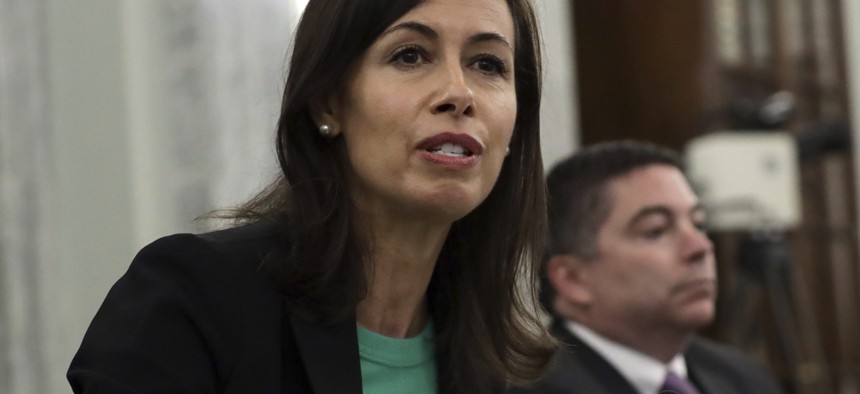FCC Acting Chair Urges States to Nix Local Broadband Restrictions

Jessica Rosenworcel answers a question during a Senate Commerce, Science, and Transportation committee hearing to examine the Federal Communications Commission on Capitol Hill in Washington, Wednesday, June 24, 2020. Jonathan Newton/The Washington Post via AP, Pool
More than 20 states make it difficult, if not impossible, for municipalities to establish broadband service. “We have to embrace all kinds of solutions,” said Jessica Rosenworcel during a Route Fifty panel.
The acting chairwoman of the Federal Communications Commission urged state legislatures to revise laws that prohibit municipalities from operating broadband networks, calling the restrictions “unfair” to local governments.
“I hope this is an issue some of the state legislatures can revisit,” said Jessica Rosenworcel as she spoke Tuesday at a Route Fifty panel discussion about efforts to expand broadband access.
Twenty-two states have restrictions in place that either ban or make it extremely difficult for municipalities to establish broadband networks, according to a recent report from Broadband Now.
The coronavirus pandemic has highlighted the importance of access to high-speed internet and spurred investment at the state, local and federal level to improve broadband infrastructure. Lawmakers and government officials will have to think creatively to ensure that all households in the United States have access to high-speed internet, and municipal-operated broadband is just one way legislators can try to help meet that goal, Rosenworcel said.
“We recognize if we want to reach 100%, we have to embrace all kinds of solutions,” she said.
The Biden administration is looking to incentivize reliance on municipal-owned broadband as part of its infrastructure package, meanwhile some states have taken action to allow local governments to enter the market.
Five states considered proposals this year to remove barriers to establishing local broadband networks, but only two are expected to pass legislation.
The Arkansas legislature approved, and the governor signed, a bill, that allows cities or counties to issue bonds to pay for the construction of telecommunication infrastructure, including broadband networks. The local governments would then pay off the bonds by partnering with an internet service provider and leasing the infrastructure to that provider.
In Washington, the governor is expected to sign legislation that would allow municipalities to offer retail broadband service.
While the Biden administration’s coronavirus stimulus plan targets billions of dollars toward broadband expansion, the president’s infrastructure plan encourages municipal broadband development by specifically prioritizing funding toward broadband networks owned or operated by local governments, nonprofits and cooperatives. Those providers face “less pressure to turn profits” and have a “commitment to serving entire communities,” the White House said.
But the Biden plan could face pushback from Republicans in Congress, who introduced a bill that would prohibit states and cities from building networks unless there is no more than one commercial provider offering broadband service in an area. The bill, dubbed the CONNECT Act, would “promote competition by limiting government-run broadband networks throughout the country and encouraging private investment," Republican members of the House Energy and Commerce Committee said in an announcement about the bill.
State and local governments can also play a role in reducing broadband service gaps by engaging with their communities to find out where service is lacking, Rosenworcel said. The FCC has sought to improve the accuracy of its broadband maps, but Rosenworcel said local governments will be better positioned for grant funding if they collect more nuanced data about their communities.
Andrea Noble is a staff correspondent with Route Fifty.
NEXT STORY: Centralizing State IT Functions Gains Momentum





